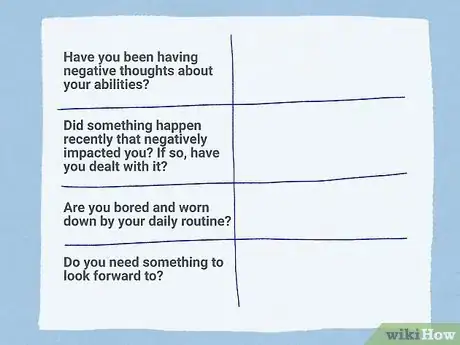This article was co-authored by Jennifer Butler, MSW. Jennifer Butler is a Love & Transformation Coach and the Owner of JennJoyCoaching, a life coaching business based in Miami, Florida, although Jennifer works with clients all over the world. Jennifer’s work centers around empowering women who are navigating any stage of the divorce or breakup process. She has over four years of life coaching experience. She is also the co-host of the Deep Chats Podcast along with Leah Morris and the host of season 2 “Divorce and Other Things You Can Handle” by Worthy. Her work has been featured in ESME, DivorceForce, and Divorced Girl Smiling. She received her Masters of Social Work (MSW) from New York University. She is also a Certified Health Coach, a Communications & Life Mastery Specialist, and a Certified Conscious Uncoupling and Calling in “the One” coach.
wikiHow marks an article as reader-approved once it receives enough positive feedback. In this case, several readers have written to tell us that this article was helpful to them, earning it our reader-approved status.
This article has been viewed 341,948 times.
If you've lost interest in things that you typically enjoy, or you find yourself unable to care about most things, you might be dealing with apathy. This can be really tough to handle, and one of the challenges is finding the motivation to change. There are a lot of possible reasons for feeling apathetic, so we're here to help you identify possible causes and create a plan for change.
Things You Should Know
- Take small steps to change your daily habits, practice acknowledging your achievements, and consider revisiting hobbies you used to love.
- Be kind to yourself by turning negative thoughts into positive ones and repeating empowering mantras.
- Step out of your comfort zone by going someplace new or trying new things.
Steps
Expert Q&A
Did you know you can get expert answers for this article?
Unlock expert answers by supporting wikiHow
-
QuestionHow do you stop apathy?
 Jennifer Butler, MSWJennifer Butler is a Love & Transformation Coach and the Owner of JennJoyCoaching, a life coaching business based in Miami, Florida, although Jennifer works with clients all over the world. Jennifer’s work centers around empowering women who are navigating any stage of the divorce or breakup process. She has over four years of life coaching experience. She is also the co-host of the Deep Chats Podcast along with Leah Morris and the host of season 2 “Divorce and Other Things You Can Handle” by Worthy. Her work has been featured in ESME, DivorceForce, and Divorced Girl Smiling. She received her Masters of Social Work (MSW) from New York University. She is also a Certified Health Coach, a Communications & Life Mastery Specialist, and a Certified Conscious Uncoupling and Calling in “the One” coach.
Jennifer Butler, MSWJennifer Butler is a Love & Transformation Coach and the Owner of JennJoyCoaching, a life coaching business based in Miami, Florida, although Jennifer works with clients all over the world. Jennifer’s work centers around empowering women who are navigating any stage of the divorce or breakup process. She has over four years of life coaching experience. She is also the co-host of the Deep Chats Podcast along with Leah Morris and the host of season 2 “Divorce and Other Things You Can Handle” by Worthy. Her work has been featured in ESME, DivorceForce, and Divorced Girl Smiling. She received her Masters of Social Work (MSW) from New York University. She is also a Certified Health Coach, a Communications & Life Mastery Specialist, and a Certified Conscious Uncoupling and Calling in “the One” coach.
Life Coach We have an internal source of joy within us, but you have to commit to keeping that well of joy and doing things that bring you happiness, whether it's going for a walk or putting on some silly puppy videos. Do 3-5 things a day that bring you happiness, since happiness is a choice and a practice. Negative emotions are normal and a part of the human experience, but you want to feel the highs as well.
We have an internal source of joy within us, but you have to commit to keeping that well of joy and doing things that bring you happiness, whether it's going for a walk or putting on some silly puppy videos. Do 3-5 things a day that bring you happiness, since happiness is a choice and a practice. Negative emotions are normal and a part of the human experience, but you want to feel the highs as well.
Warnings
- Suicidal thoughts are a sign of depression. If you suffer from apathy and think it may be related to depression, get help. There are many people who are eager to help you.⧼thumbs_response⧽
References
- ↑ https://jamesclear.com/habit-guide
- ↑ https://www.psychologytoday.com/blog/maybe-its-just-me/201306/do-the-self-loathing-see-the-same-self-others-do
- ↑ Jennifer Butler, MSW. Love & Empowerment Coach. Expert Interview. 31 July 2020.
- ↑ Jennifer Butler, MSW. Love & Empowerment Coach. Expert Interview. 31 July 2020.
- ↑ https://www.psychologytoday.com/blog/maybe-its-just-me/201306/do-the-self-loathing-see-the-same-self-others-do
- ↑ https://www.psychologytoday.com/us/blog/evolution-the-self/201604/the-curse-apathy-sources-and-solutions
- ↑ https://www.psychologytoday.com/us/blog/evolution-the-self/201604/the-curse-apathy-sources-and-solutions
- ↑ https://www.psychologytoday.com/us/blog/evolution-the-self/201604/the-curse-apathy-sources-and-solutions
- ↑ https://www.psychologytoday.com/us/blog/evolution-the-self/201604/the-curse-apathy-sources-and-solutions
About This Article
Being apathetic can make life difficult, but if you set yourself small goals and try new things, you’ll find your motivation eventually. Although you might not feel like being around other people, make an effort to spend more time with your friends and family, since being alone can easily drain your motivation and energy. If you don’t feel any pleasure in things you used to do, try new hobbies and interests until you find something you enjoy doing. Focus on taking small, manageable steps towards your goals. For example, if you need to read a book for class but don’t feel like it, set yourself the goal of reading just 1 chapter. As you start to achieve your goals, set bigger ones for yourself. However, forgive yourself when you don’t meet them, and try to put the past behind you so you can concentrate on the future. For more tips from our co-author, including how to improve your motivation through diet, sleep, and exercise, read on!










































































